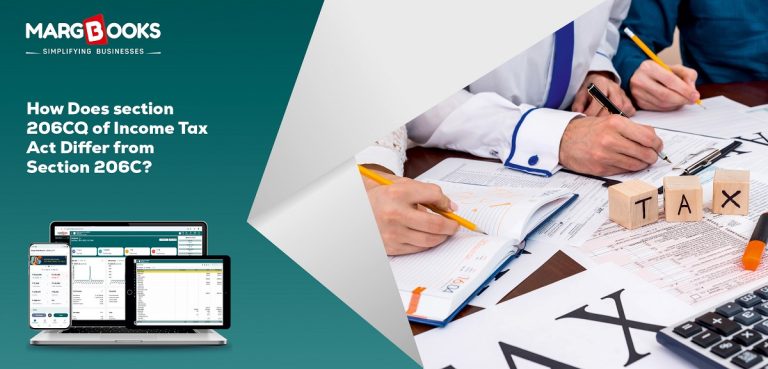Understanding tax provisions can often be overwhelming, especially when it comes to intricate details in different sections of the Income Tax Act. Among these, Section 206CQ and Section 206C are two important sections that deal with tax collection at source (TCS). While both relate to TCS, there are distinct differences in their provisions.
In this blog, we will break down the key differences between these two sections, shedding light on their applications and impact on taxpayers and businesses alike. Moreover, we will also touch upon how tools such as online GST billing software and cloud-based billing software can streamline tax-related processes and ensure better compliance.
Introduction to Tax Collection at Source (TCS)
Before diving into the differences between Section 206CQ and Section 206C, it’s important to have a basic understanding of TCS. Tax collection at source (TCS) is a mechanism where the seller collects tax from the buyer at the time of sale.
The seller is responsible for collecting the tax, depositing it with the government, and providing a TCS certificate to the buyer. This system ensures tax compliance and helps the government maintain better control over tax collections.
What is Section 206C?
Section 206C of Income Tax Act deals with TCS on the sale of certain goods. This provision requires sellers to collect tax from the buyer at the time of sale of specified goods such as alcohol, scrap, forest products, etc. The tax collected is then deposited with the government. The rates of TCS and the goods covered under this section are clearly defined by the law.
Key Highlights of Section 206C:
- Scope: Applies to the sale of specific goods (e.g., liquor, timber, scrap, etc.).
- Tax Rates: The rates of tax differ based on the type of goods being sold.
- Applicability: The seller of the specified goods is required to collect the tax.
- Documentation: The buyer receives a TCS certificate to claim credit for the TCS paid.
Types of Transactions Under Section 206C
The section specifically applies to transactions involving:
- Sale of alcoholic liquor for human consumption
- Timber or forest produce
- Scrap
- Tendu leaves
- Mineral products
- Any other goods specified by the government
The seller is required to collect tax at source from the buyer and deposit the same with the government.
What is Section 206CQ?
Section 206CQ of Income Tax Act, which was introduced through the Finance Act 2021, is related to TCS on the sale of goods and services. This section came into play primarily to tackle the growing digital economy and to ensure greater compliance with online transactions. It imposes TCS on the sale of goods if the aggregate value of the sale exceeds Rs. 50 lakh in a financial year.
Unlike Section 206C, which applies to specific goods only, Section 206CQ is more general. It applies to the sale of goods irrespective of the type, as long as the value of the sale exceeds the specified limit.
Key Highlights of Section 206CQ:
- Scope: Covers the sale of all goods, not restricted to specific goods.
- Threshold Limit: TCS applies only when the value of the sale exceeds Rs. 50 lakh in a financial year.
- Tax Collection Mechanism: The seller must collect the tax from the buyer at the time of sale.
- Exemptions: If the buyer is a resident in India and the goods are for personal use, they may be exempt.
Impact of Section 206CQ:
Section 206CQ is aimed at expanding the base of tax collection to the digital marketplace. With the rise of cloud-based billing software and online GST billing software, sellers now need to ensure that their sales platforms and invoicing systems are up-to-date with the latest tax compliance requirements. Using such digital tools ensures that taxes are correctly calculated and collected during each transaction, simplifying compliance for businesses operating online.
Key Differences Between Section 206CQ and Section 206C
While both Section 206CQ and Section 206C deal with the collection of tax at source, they apply under different circumstances and have varying provisions. Here’s a detailed comparison to help you understand their differences:
1. Applicability:
- Section 206C: Applies only to the sale of specified goods such as liquor, scrap, and timber.
- Section 206CQ: Applies to the sale of all goods as long as the aggregate sales exceed Rs. 50 lakh during the financial year.
2. Threshold Limit:
- Section 206C: No threshold limit is specified for most goods. TCS applies to all sales of specified goods, regardless of the sale value.
- Section 206CQ: TCS is applicable only if the aggregate sales exceed Rs. 50 lakh in a financial year.
3. Tax Collection:
- Section 206C: The tax is collected at the time of sale of specified goods.
- Section 206CQ: The tax is collected at the time of sale of any goods (provided the threshold is met).
4. Focus of the Provision:
- Section 206C: Primarily focused on the sale of physical goods, including traditional industries such as scrap dealers and liquor vendors.
- Section 206CQ: Aimed at digital transactions and online commerce, encouraging the collection of tax even on goods sold over digital platforms.
5. Impact on Businesses:
- Section 206C: The businesses involved in the sale of specific goods, such as liquor and scrap are directly impacted.
- Section 206CQ: E-commerce platforms, online sellers, and businesses with significant digital transactions need to ensure they are compliant with this provision.
How Can Margbooks Help?
For businesses, especially those dealing with a large number of transactions or selling online, tax compliance can become a cumbersome task. This is where tools like Margbooks, a leading online GST billing software, come in.
Margbooks simplifies the process of generating GST-compliant invoices, tracking sales, and ensuring that taxes are correctly calculated based on the provisions of both Section 206CQ and Section 206C. As a cloud-based billing software, Margbooks ensures that you can manage your finances and invoices anytime, anywhere, offering a hassle-free experience for business owners.
Benefits of Using Margbooks:
- Real-time GST calculation: Automatically applies the correct TCS rates based on the transaction.
- Multi-device access: Being cloud-based, it can be accessed from any device.
- Comprehensive reporting: Track and manage all sales and tax collection in one place, ensuring compliance with both Section 206C and 206CQ.
Conclusion
Understanding the differences between Section 206CQ and Section 206C is essential for businesses to ensure proper tax collection and compliance. While Section 206C of Income Tax Act applies to specific goods, Section 206CQ expands the scope to include all goods if the sale threshold exceeds Rs. 50 lakh in a year.
For businesses that deal with digital transactions or run online platforms, integrating tools, online GST billing software, and cloud-based billing software, such as MargBooks, can simplify tax compliance and ensure that the correct TCS is collected on all applicable transactions.
By staying updated with these tax provisions and leveraging modern billing software, businesses can focus more on growth while ensuring that their tax obligations are met with ease.




